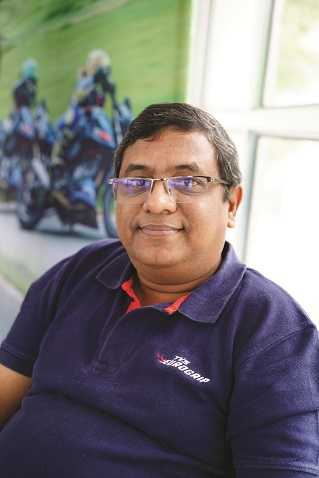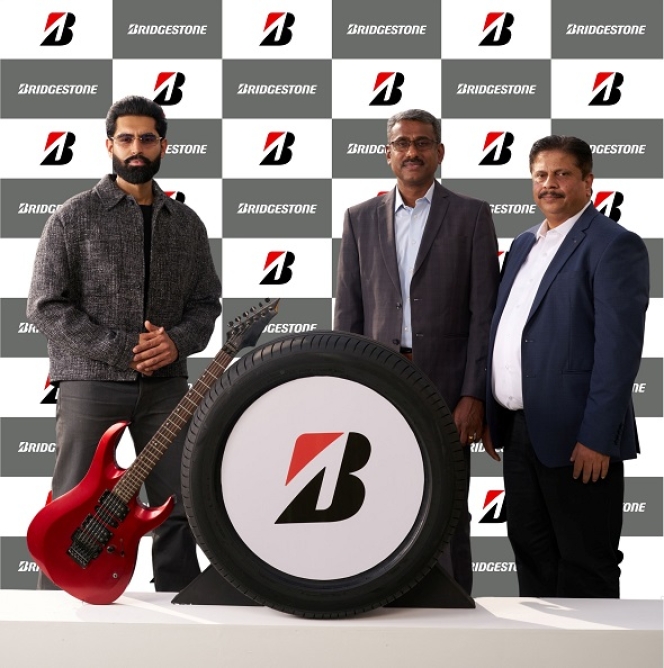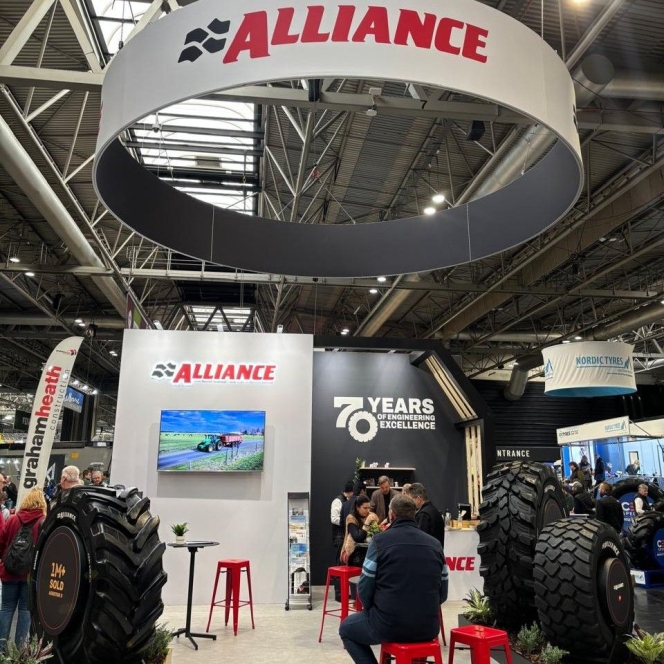The Unsung Hero Of Motorcycling: The Vital Role Of Tyre Testing
- By Rommel Albuquerque
- December 30, 2024

When it comes to motorcycle performance, enthusiasts often focus on the engine, the suspension or the design. However, one crucial element that directly impacts safety and performance is often overlooked: the tyre. Despite being the only point of contact between the motorcycle and the road, tyres play a pivotal role in determining how a bike handles, grips and responds to rider inputs. In motorsports and everyday riding alike, tyres are the unsung heroes – vital components that require meticulous testing and development to perform at their best in all conditions.
Motorcycle tyres are engineered to handle a wide range of challenges, from extreme cornering forces on the track to the unpredictable surfaces found on rural roads. Whether you're a weekend cruiser or a competitive racer, the tyre is what connects you to the road, affecting everything from grip and braking to comfort and fuel efficiency. But the process of getting that perfect tyre to market is far from simple. It involves months of testing, refinement and technology-driven innovations designed to meet the demands of every type of rider.
Sagar Sheldekar, the founder of Living It Up and a seasoned expert in motorcycle testing, offers valuable insight into the importance of tyres. He explains that there are a few essential parameters he focuses on when testing a tyre. "The three most critical factors for me are grip, feedback and agility. While longevity is important, you can't gauge that immediately. A tyre with good grip and feedback allows you to push harder and ride more safely," he says.

Sheldekar, who has tested a wide range of motorcycles and tyres, explains that while tyres like Michelin excel in wet conditions due to their grip on slippery surfaces, he finds their feedback lacking. “A tyre that talks to you is important,” Sheldekar continues. “You need to feel how much grip you have, especially when you're riding aggressively or pushing the limits in a corner. A tyre that doesn't provide that feedback makes it harder to ride with confidence.”
He also discusses how the profile of a tyre can drastically influence a bike’s handling. "Take the Suzuki Katana, for example," he explains. "Despite having a fantastic engine, it was difficult to handle aggressively due to its flat tyre profile. On the other hand, tyres with more agile profiles make a bike easier to steer and handle, especially when you're pushing hard."
This illustrates a key aspect of tyre testing: it's not just about grip, but how the tyre responds to rider inputs and how it complements the overall dynamics of the motorcycle.
On the manufacturing side, V Sivaramakrishnan, Chief Technology Officer at Eurogrip Tyres, shares how tyres are tested for the Indian market. He explains that each category of motorcycle tyre – whether touring, off-road or sports – undergoes a different set of tests to ensure it meets the specific requirements of the segment. For instance, tyres designed for touring bikes go through different tests than those made for off-road or trail bikes.
“The testing process for a new product begins with indoor tests, such as high-speed durability and burst strength,” says Sivaramakrishnan. “Once these are done, we move on to rolling resistance and grip testing. We test tyres under different conditions, such as dry, wet and varied asphalt textures, and we also carry out tests in different climates, from the hot temperatures of India to the cold, wet conditions of Europe and Japan.”
For wet grip, a special test is conducted where a thin layer of water is spread over the track, ensuring consistent friction during the test. Using advanced sensors mounted on the bike, the deceleration and grip levels are carefully measured. Expert riders then push the tyres to their limits, testing how they perform in cornering, lane changes and other dynamic manoeuvres.

Beyond performance, tyre durability is just as important. Eurogrip conducts extensive real-world testing by sending convoys of vehicles on designed duty cycles that replicate actual usage – factoring in load, speed and terrain. This simulates how a tyre will perform over time and under different riding conditions.
Once internal testing is complete, tyres must pass homologation tests to meet country-specific regulations. In India, this means obtaining an ISI certification, while in Europe, it might be ECE-certified. These certifications ensure that tyres adhere to safety and performance standards specific to each market.
The entire process, from initial testing to certification, can take anywhere from six to nine months. The costs involved are significant, with manufacturers investing considerable resources to ensure the tyres not only meet but exceed performance expectations.

Tyre testing, while largely unseen by the average rider, is a crucial part of motorcycle safety and performance. It ensures that each tyre is optimised for maximum grip, durability and handling, giving riders the confidence to perform at their best. The next time you hit the road – whether cruising on a scenic highway or racing on a track – remember that the tyre beneath you has been tested through rigorous processes to make your ride safer and more enjoyable.
In the end, the importance of tyres cannot be overstated. As Sheldekar succinctly puts it, “You can have the most powerful engine, but if your tyre isn’t up to the task, you won’t be able to safely harness that power.” The unseen work that goes into tyre testing in India and around the world is what makes that safe, exhilarating ride possible – no matter where the road takes you.
Bridgestone India Taps Punjabi Star Parmish Verma For Regional Growth Push
- By TT News
- January 27, 2026

In a strategic move to strengthen its connection with vital regional audiences, Bridgestone India has partnered with multifaceted Punjabi star Parmish Verma. This collaboration is designed to resonate deeply in North India, a crucial and rapidly expanding market fuelled by increasing vehicle ownership and a youthful demographic. Verma, a prominent cultural figure and known automobile enthusiast, aligns naturally with the brand’s emphasis on safety, reliability and performance. His authentic passion for vehicles and responsible driving complements Bridgestone’s identity as a leading mobility solutions provider.
Central to this alliance is the co-creation of engaging, music-led narratives and digital content for Bridgestone’s campaigns, leveraging Verma’s artistic talents and significant social influence. This approach recognises the powerful role of popular culture in shaping brand preferences within the region. The partnership also advances the company’s broader regional engagement goals, aiming to build deeper trust with consumers nationwide. Furthermore, it embodies the ‘Emotion’ principle of Bridgestone’s corporate commitment, which seeks to inspire excitement and deliver joy through mobility. By uniting with a figure of Verma’s reach and genuine interest, Bridgestone India fosters a more dynamic and culturally relevant dialogue with its audience.
Rajiv Sharma, Executive Director – Sales & Marketing, Bridgestone India, said, “North India is a strategically important market for us. Parmish Verma’s credibility and deep connection with audiences make him an ideal partner to represent Bridgestone. This collaboration enables us to engage meaningfully with young consumers who seek fresh, inspiring and relatable brand experiences.”
Verma said, “Bridgestone is a brand people trust for safety and performance. I’m proud to be associated with an organisation that values quality and puts customers first. I look forward to connecting with audiences in a new and meaningful way through this partnership.”
Bridgestone Americas Appoints Michele Herlein As New Chief People Officer
- By TT News
- January 24, 2026

Bridgestone Americas has appointed Michele Herlein as its new Chief People Officer. In this role, she will oversee all human resources operations across the Americas, Europe, Middle East and Africa. Her primary focus will be advancing the company's Culture 2.0 initiative, which aims to enhance teammate empowerment, collaboration and accountability.
Herlein rejoins Bridgestone with over two decades of executive leadership expertise. Her background includes previous positions within Bridgestone Americas and Bandag, Inc., centred on culture, leadership development and succession planning. Most recently, she was the Founder and CEO of CultureMax and previously served as the Chief Administrative and Human Resource Officer at Barge Design Solutions. She is also a published authority on creating high-performance organisational cultures. Beyond her corporate work, Herlein is a co-founder of Impact100 Nashville, a philanthropic women’s collective that has awarded more than USD 1.2 million in grants to area nonprofits.
Scott Damon, Bridgestone West CEO and Group President of Bridgestone Americas, said, “I am excited to welcome her back to Bridgestone, recognising the perspective and presence she will add to our West leadership team, the HR function and the broader organisation.”
- Alliance Tyres
- Yokohama-ATG
- Agri Star II Row Crop
- LAMMA UK 2026
- Agricultural Tyres
- Off-Highway Tyres
Alliance Displays Agri Star II Row Crop Tyre At LAMMA UK 2026
- By TT News
- January 24, 2026

Alliance, a prominent global tyre brand under Yokohama-ATG, introduced its new Agri Star II Row Crop tyre to the UK agricultural sector during the recent LAMMA UK 2026 event. This launch marked the product's UK debut following its initial presentation at Agritechnica 2025. The tyre is specifically engineered for row crop tractors and specialist machinery, including self-propelled and trailed sprayers, operating in crops such as cereals, maize and oilseed rape.
Central to the tyre's design is Alliance's Stratified Layer Technology (SLT), which incorporates two distinct rubber layers within each lug to maintain reliable traction and stability even as the tyre wears. This approach is part of a design focused on mitigating soil compaction through a wider tread that improves load distribution, thereby helping to protect soil structure and preserve crop yields.
To address the evolving demands of modern farming, the tyre is built for high-speed road travel, boasting an E-speed rating that allows for operational speeds up to 70 kmph. This capability accommodates the increasing distances machinery must cover between fields. Simultaneously, the tyre is engineered to provide effective low-pressure performance during actual field work. It brings VF technology to this segment, a critical development as agricultural equipment continues to grow in both weight and the frequency of road use.
The construction emphasises durability, incorporating features like a stubble guard and advanced, wear-resistant compounds to ensure a long service life under challenging conditions. Available in rim sizes ranging from 24 to 54 inches, the Agri Star II Row Crop is designed for compatibility with a broad spectrum of contemporary farm machinery. This new model extends the proven platform of the Agri Star II series, of which over one million units have been sold globally, delivering its established technological benefits into the specialised realm of row crop agriculture.
Hankook Tire Appoints New VP Of Marketing For North America
- By TT News
- January 23, 2026

Hankook Tire has appointed Seunghwan (Aaron) Hong as Vice President of Marketing for its North America Headquarters in Nashville. He assumes this position following the promotion of Kyuwang (Ken) Cho, who is now leading the company’s Global Truck & Bus Division from Seoul.
In his new capacity, Hong will be responsible for North American marketing strategy, technical services, Canadian operations and supply chain logistics, focusing on strengthening the brand’s support for regional tyre dealers. Hong’s extensive two-decade career with Hankook includes leadership roles such as Managing Director in Canada and the Netherlands, along with a strategic position in the Global TB sales division.
Cho, who previously served as Senior Vice President of Sales and Marketing in North America, returns to Korea, where he had earlier held a senior global sales role within the TB division.
Rob Williams, President, Hankook Tire America Corp., said, "We're thrilled to welcome Aaron to Nashville as our new Vice President of Marketing. He brings a wealth of global experience and a proven ability to drive growth across diverse markets. As we continue to expand our brand and strengthen relationships with our dealers throughout North America, Aaron's strategic vision will be key to advancing Hankook's innovation and performance in the tyre market. We are appreciative of Ken's leadership over the past year in elevating our presence across both consumer and commercial channels."







Comments (0)
ADD COMMENT